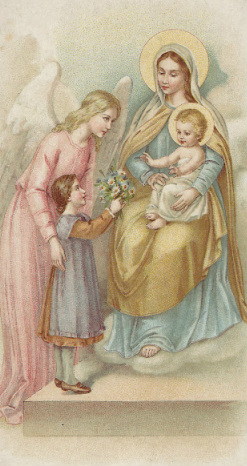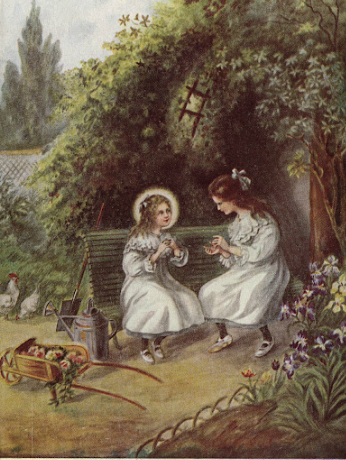
~ St. Francis Xavier ~
Manual of the Holy Catholic Church,
Imprimatur 1906
 "And in general, see that you take infinitely less care of those edifices which are raised with stone and mortar, than of the spiritual temples of God; these temples are your brethren and the pupils entrusted to your faithful care, whom you should feed, watch over, and especially urge on to advance in virtue; this is the sovereign duty committed to your zeal. ~ St. Francis Xavier ~ Manual of the Holy Catholic Church, Imprimatur 1906
0 Comments
The Example of Our Blessed Lord
AND they brought to Him young children, that He might touch them. And the disciples rebuked them that brought them. And when Jesus saw it, He was much displeased, and said to them: "Suffer the little children to come to Me, and forbid them not: for of such is the kingdom of God." St. Mark 10. 13-16. ON THE DUTY OF THE CHRISTIAN MOTHER St. Monica, before the birth of the great St. Augustine, dedicated him by frequent oblations to the Christian religion, and to the service and glory of God, as he himself witnesses, saying : " That he hath already tasted the salt of God in his mother's womb." This is a great lesson for Christian women to offer up to His Divine Majesty the fruit of their wombs, even before they come into the world ; for God, who accepts the offerings of an humble and willing heart, commonly at that time seconds the affections of mothers; witness Samuel, St. Thomas of Aquin, St. Andrew of Fiesola, and divers others. The mother of St. Bernard, a mother worthy of such a son, as soon as her children were born, took them in her arms, and offered them up to Jesus Christ, and from thence forward loved them with respect, as things consecrated and entrusted to her by God; which succeeded so happily to her that in the end the whole seven became very holy. But when children begin to have the use of reason, both their fathers and mothers ought to take great care to imprint the fear of God in their hearts. The good Queen Blanche performed this office fervently with regard to the King St. Louis, her son; she often said to him: "I had much rather, my dear child, see you die before my eyes, than see you commit even one mortal sin ;" which caution remained so deeply engraved on his soul that, as he himself related, not one day of his life passed in which he did not remember it, and take all possible care strictly to observe it. Families and generations in our language are called houses ; and even the Hebrews called the generations of children the building up of a house; for it is in this sense it is said that God built houses for the midwives of Egypt. Now, this is to show that the raising of a house or family consists not in storing up a quantity of worldly goods, but in the good education of children in the fear of God, and in virtue, in which no pains or labors ought to be spared, for children are the crown of their parents. ~ St, Francis de Sales.~  Mary, obtain for me the gift that I may have the confidence of my children. As you know, a mother needs this confidence in order to guide her children properly. When there are difficulties or problems or troubles, may they be shared with me trustingly, that i may be able more readily to perform a mother's task of helping her child. And, Mother Most Prudent, when this confidence is shown, teach me how to help and instruct my child. Be to me a Mother of Good Counsel and direct me at all times in the responsibilities of my holy office of motherhood. Amen. ~ Seat of Wisdom, pray for us! taken from: The Mother's Manual, Imprimatur 1943 A PRAYER FOR PARENTS, FOR THEMSELVES, AND FOR THEIR CHILDREN
O Father of mankind, Who hast given unto me these my children and committed them to my charge, to bring them up for Thee, and to prepare them for everlasting life, assist me with Thy heavenly grace, that I may be able to fulfill this most sacred duty and stewardship. Teach me both what to give, and what to withhold; when to reprove, and when to forbear; make me to be gentle, yet firm; considerate and watchful; and deliver me equally from the weakness off indulgence, and the excess of severity; and grant that, both by work and example, I may be careful to lead them in the ways of wisdom and true piety; so that at last I may with them, be admitted to the unspeakable joys of our true home in heaven, in unity of the blessed angels and saints, where Thou, O Father, with Jesus, Thy only begotten Son, in the unity of the Holy Ghost, livest and reignest one God, forever and ever. O heavenly Father, I commend my children unto Thee, Be Thou their God and Father, and mercifully supply whatever is wanting in me through frailty of negligence. Strengthen them to overcome the corruptions of the world, too resist the solicitations of evil, whether from within or without; and deliver them from the secret snares of the enemy. Pour Thy grace into their hearts, and confirm and multiply in them the gifts of the Holy Ghost, that they may daily grow in grace, and in the knowledge of Our Lord Jesus Chrrist; and so faithfully serving Thee here, may cometo rejoice before Thee hereafter. Through the merits of the same our Lord Jesus Christ, Who with Thee and the Holy Ghost liveth and reigneth. Amen. ~ Goffine's Devout Instruction, Imprimatur 1896 ~  TO FATHERS AND MOTHERS The Heart of a child is as wax, capable of receiving any impression, good or bad; it is a plain white linen, upon which all colors may be stamped. It is to parents that God has entrusted the care of impressing on these young, pure hearts all true and virtuous feelings, those first impressions which are never completely effaced. If they are careful to inculcate in their children the sentiment of duty, the love and fear of God, a horror of sin, and the necessity of religion, they lay the foundation of the future happiness of these little ones whom the providence of God has confided to their care. How often the sorrow and trouble by which fathers and mothers are overwhelmed toward the close of their lives is trouble which they have entirely brought upon themselves! They reap what they have sown by their neglect, their want of faith, and by the few good examples with which they surrounded the early youth of their son, or of their daughter. But, on the other hand, how happy and peaceful are the closing years of life to the father and mother who have spent their days in one lifelong endeavor to make their children true and earnest Christians! They, too, shall reap what they have sown; fruits of peace and joy and love, of which death itself shall not be able to deprive them, and which shall follow them even unto the bosom of their God. ~From Monseigneur De Segur~ "The Faith That Never Dies," Imprimatur 1900  Below is a lovely article, where I acquired it I don't actually know. May God give us all the grace and wisdom to raise our children to be Saints! PRAYER TO THE HOLY GHOST Come, O Spirit of Wisdom, and reveal to my soul the mysteries of heavenly things, their exceeding greatness, power and beauty. Teach me to love them above and beyond all the passing joys and satisfactions of earth. Help me to attain them and possess them forever. Amen. More than a century ago, on April 9th, 1888, Thérèse Martin entered the Carmel of Lisieux where she was to die 9 years later in the odor of sanctity. But we should make no mistake: St. Thérèse did not become a Saint in 9 years. The young girl of 15 who crossed the threshold of Carmel that day had already advanced quite far on the "straight way that leads to Heaven". Her parents were her first "Novice Masters" and their own holiness strongly influenced the future Saint. It is certainly worth noting that both Mr. and Mrs. Martin are candidates for beatification. They have already passed the first step towards canonization by being declared Venerable. Many of the letters written by St. Thérèse's mother are still extant and, besides giving us many details about the Martin family, they form almost a treatise on Catholic education. Mrs. Martin understood very well that Catholic education means much more than morning and evening prayer, attendance at Mass and sending the children to a good Catholic school. After bestowing natural life, parents must see to it that their children receive also supernatural life through Baptism. And then, they have to foster the development both of the body and of the soul. Mrs. Martin, as a truly Catholic mother, always gave priority to the soul. She considered her children as a sacred trust received from God and never lost sight of this important truth: a child is not a plaything. If baptism removes original sin, it nevertheless leaves in the soul the four wounds of malice, infirmity, ignorance and concupiscence. Anyone who has been around little children knows that this is no mere theory. Very soon little ones begin to manifest evil tendencies. Too often, parents smile at these childish outbursts of anger, jealousy, stubbornness, pride, etc... which they even consider "cute". No, a child is NEVER CUTE when he is stubborn, proud, etc... Vices are like weeds. If you uproot them as soon as they show up, you will pull the whole thing out without difficulty. But, do not weed your garden for a few weeks... and you will see the result! If children are corrected from their early childhood, the whole task of education will be much easier. Mrs. Martin never showed any weakness. She never allowed stubbornness or childish whims. Writing to her brother about Pauline (the future Mother Agnes of Jesus), she could say: "I have never spoiled her, and LITTLE THOUGH SHE WAS, I never let anything pass unchecked. Without making a martyr of her, I nevertheless made her obey." Children can easily be "fussy" at table. St. Thérèse's parents never gave way on this point. At table, children had to behave themselves and no grumbles at dishes they did not like much were ever tolerated. This may seem trivial matter, and how often parents take the easy way out by just yielding to their children. No one will deny that it is a trying task to train children to eat everything, but it is of much greater importance than it may seem at first sight. In fact, you do not only train your children's eating habits, you also train their will, and they will need a strong will to remain Catholic in our apostate world. In Lent, Mrs. Martin would subject the menu to some restrictions and all the fasts of the Church were scrupulously observed, which is an example all Catholic families should follow. It proves to be a great means of promoting a true spirit of mortification in the children. You may raise the objection: "What a dull life for children!" Oh, no! The Martin family was happy and cheerful and the five girls were very lively. Mrs. Martin had a real gift for stimulating the generosity of her children. She always used supernatural motives to persuade them to fulfill their duties: a sinner to convert, to console Our Lord, etc... In a letter, she reports that her eldest daughter, Marie, valiantly faced the dentist – remember, they did not put your mouth to sleep in those days! – to obtain graces for her grandfather who had died recently. Marie was only 9 years old then, and she even felt sorry when the dentist did not pull out her tooth. "It is a pity", she exclaimed, "Grandpa would have left Purgatory!" Later on, when her eldest daughters had reached their teens, Mrs. Martin knew how to let them talk freely with her. She deemed it very important that her girls could express their mind fully so that, with much tact and kindness, she could rectify her daughters' judgment and teach them how to look at everything from the standpoint of Faith. The best praise of her "educational system" was given her by her own daughters at the process of beatification of St. Thérèse: "We were not spoiled. Our mother watched very carefully over her children's souls, and not the smallest fault ever went unreproved. Her training was kind and loving, but attentive and thorough." St. Thérèse of the Child Jesus is probably the only Saint about whose childhood we have so many details. In the first four and a half years of St. Thérèse's life, Mrs. Martin wrote over 120 letters, mainly to her brother and to her daughter Pauline. These letters are an invaluable source of information. They reveal to us the dawn of sanctity in a soul as well as the important part played by the parents in the formation of a Saint. In spite of all her good qualities, St. Thérèse was not born a Saint. Like the rest of us, she had been wounded by original sin and if her defects were small, they were nevertheless real. there is, for instance, the delightful incident of the two sugar rings, a treasure for a little girl. St. Thérèse, who had a heart of gold, resolved to give one of the rings to her sister Celine. Alas, on the way home she lost one of the precious rings. What was she to do? Should she give the only ring left to Celine or keep it for herself? The shrewd little girl soon found the solution to this dilemma and declared that, unfortunately, it was Celine's ring that got lost! And the Saint comments: "See, how from childhood we instinctively safeguard our own interests!" And who will not see the "daughter of Eve" in the little Thérèse who thought she would have looked much nicer with her arms bare when her mother had her wear a pretty dress but with long sleeves?! St. Thérèse had remarkable qualities too, especially her crystal-clear honesty. Mrs. Martin could write, with some legitimate parental pride: "The little one would not tell a lie for all the gold in the world." Little Thérèse would always avow her baby faults to her parents without seeking any excuse and would then ask for forgiveness and await her punishment. There is something very charming in this innocent child and it is best expressed in Mrs. Martin's own words, in a letter to Pauline: "She (Thérèse) had broken a small vase, the size of my thumb, which I had given to her that morning. As usual when she has any accident, she came at once to show it to me. I showed some displeasure. Her little heart swelled...A moment later, she ran to me and said: 'Don't be sad, Mother, when I earn money, I promise you I will buy you another.' As you see it will be a while before I get it!" St. Thérèse was an oversensitive little girl. Her eyes would easily fill with tears. One day Celine accused her of "bringing up her dolls badly and letting them have their way." That was enough to make Thérèse cry. Yet she did not have a weak character, on the contrary she had a very strong will and could even be stubborn. Referring to her two main "weaknesses", i.e. her oversensitiveness and her strong will, St. Thérèse wrote: "With such dispositions, I feel sure that, had I been brought up by careless parents, I would have become very wicked, and would maybe even have lost my soul." Such a statement should arouse in parents a salutary fear and make them realize their responsibility. Try to imagine what St. Thérèse would have become if she had spent most of her time sprawled on the carpet watching TV or listening to rock music, if she had been free to indulge all her whims...A good form of examination for parents would be the answer to the following question: "Would St. Thérèse have become a Saint if she had been brought up the way I bring my children up?" If the answer is "no", then think of the account Mrs. Martin would have had to render to God if, through a careless upbringing, she had deprived God and the world of St. Thérèse... We are sure you will then lose no time in reforming your method of education, for the greater good of your soul and of your children's souls. Let us place ourselves at Mrs. Martin's school. The first thing to bear in mind is that, by baptism, any child is God's child. Several times a day, Mrs. Martin would put on her little girl's lips this little prayer: "My God, I give You my heart; Take it, please, so that no creature may possess it, but You alone, Jesus." St. Thérèse was taught to do everything to please God, and for love of Jesus. One day, Thérèse could not open the door of the room where Celine was having her lessons. In her frustration, she lay down in front of the door. Her mother told her that she should not behave like this. But the next day, when she found herself before the closed door, she lay down on the floor again. Her sister Mary told her: "Little Thérèse, you hurt the little Jesus very much when you do this." Thérèse looked up at her sister. She had understood and she never did it again. Her mother initiated her from a very early age in the art of making sacrifices and when St. Thérèse wrote that since the age of three she had never refused anything to the Good God, it was a tribute not only to her personal holiness but also to Mrs. Martin's method of education. There is no cry-room in France and St. Thérèse had to behave herself in church. She loved to go to Mass and at two and a half she would cry if she could not go not only to Mass but also to Vespers. Even though she was very intelligent, she nevertheless surprised her parents when she declared one day: "The sermon was better than usual, but it was long all the same"!! Cry-rooms are not bad in themselves, but alas, too often parents use them as nurseries. It is certainly easier to let your little ones cry, play and eat in the cry-room than to discipline them and teach them how to behave in the House of God. But how many children are drastically retarded in their spiritual growth because up to the age of three, four, or five they have never attended Mass outside of a cry-room, playing, eating, etc... Parents must apply to themselves the words of St. Paul (I Cor. 3:9). They are "God's helpers", and their children are "God's tillage, God's building". God found in Mrs. Martin a faithful collaborator. To be the mother of a Saint was her happiness on earth and it is her glory in Heaven. This happiness and this glory are meant to be yours too, if you cooperate with God in the work of the sanctification of your children. |
Thoughts, prayers, stories and other things for us Moms on our journey toward Heaven.
Archives
March 2018
Categories
All
|